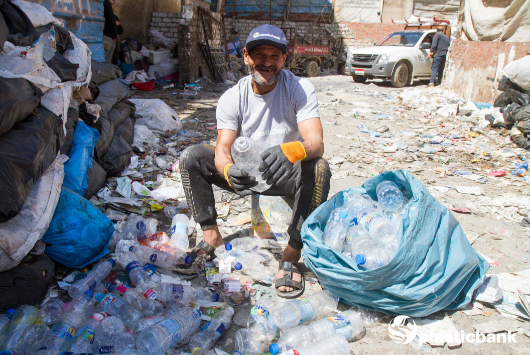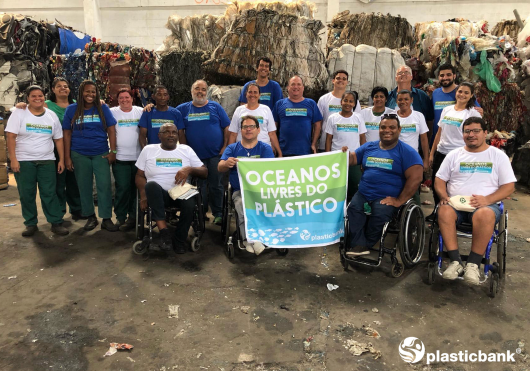
A truly ground-breaking innovation, Social Plastic® is recycled material with social impact. In addition to reducing ocean-bound plastic pollution, the production of Social Plastic® helps local collectors in vulnerable coastal communities gain access to stable income and basic family necessities. By giving plastic waste value and treating it as currency, Plastic Bank is building a circular economy, improving the lives of people in developing countries and putting recycled plastic feedstock back into the supply chain.
A world emergency
Did you know that one rubbish truck full of plastic waste enters our oceans every minute? Experts predict that, by 2050, there will be more plastic in the ocean than fish, with over 88% of the ocean’s surface already thought to be polluted by plastic waste. Single-use plastic has found a happy home in our throwaway society but has wreaked havoc on our planet’s ecosystem and looks set to do far more damage if nothing is done to stem the flow.
“The generations that move past me; that lived with the financial crisis, marine debris, ocean acidification, and climate change, are in full awareness that, unless we act, humanity will end!”
Plastic Bank founder, David Katz
Did you know, however, that the impact is not only detrimental to the environment? It is also having an enormous effect on communities across the globe, with Europe, Australia and the US shipping a huge amount of their plastic waste out to developing countries that lack the infrastructure to manage it, resulting in grim health consequences for locals and further widening of a global poverty gap.
Plastic Bank is working to create a world without waste
With plastic pollution continuing to damage the health and livelihoods of millions of people living in poverty, Plastic Bank has stepped up to effect change. Setting up what it refers to as ‘recycling ecosystems’ in coastal communities – identifying the topocean pollution sources, including the Philippines, Brazil, Indonesia and Egypt – the organisation enables local collectors to take back an element of control: collecting plastic waste in exchange for bonuses at one of Plastic Bank’s collection branches . Members are provided with workwear and tools to support their efforts.
To date, Plastic Bank has opened 540 branches, with 38,000 registered members helping to collect plastic waste. Together, Plastic Bank’s collectors, branch owners, partners, contributors and employees have prevented more than 2 billion plastic bottles from entering the world’s oceans – with the most recent billion being stopped in just eight months, 12 times faster than the first billion!

The social and economic impact matters too
But it’s about more than just pollution; Social Plastic® is about ending poverty through a regenerative economy. Collectors receive bonuses above-market rate from Plastic Bank for the plastic they collect, receiving digital tokens that can be used for basic family necessities, like groceries, cooking fuel, school tuition, health insurance, digital connectivity, mobile phone minutes, smart phones, digital tablets and more. The bonuses paid to Plastic Bank’s collectors help them build a path out of poverty and the organisation’s branches help to further empower these communities through education by offering local training workshops on topics such as waste management, financial literacy, digital enablement, and health.
“The greatest transformation that I’ve experienced in the lives of our collectors is the ability to believe in a better tomorrow. How difficult it might be to imagine yourself living in poverty with no hope, no opportunity, no income, no food, and no community. How hopeless and devastating. The biggest change I continue to witness is the opportunity for people to realise that they have power in themselves… Nassau made with Social Plastic® is an inspiring opportunity for the world to gather together. The seat of regeneration. Every time someone sits, every time someone moves that chair, the world gets a little bit better!”
Plastic Bank founder, David Katz
Find out more about Plastic Bank at www.plasticbank.com
OCEAN PLASTIC POLLUTION – THE TERRIFYING FACTS
- More than 1 million seabirds and 100,000 marine animals die from plastic pollution every year.
- 100% of baby sea turtles have plastic in their stomachs.
- There is now 5.25 trillion macro and micro pieces of plastic in our ocean & 46,000 pieces in every square mile of ocean, weighing up to 269,000 tonnes.
- Every day around eight million pieces of plastic makes their way into our oceans.
- The Great Pacific Garbage Patch is around 1.6 million square kilometres – that’s bigger than Texas!
- The world produces 381 million tonnes in plastic waste yearly – this amount is set to double by 2034.
- 50% of this is single-use plastic & only 9% has ever been recycled.
- Over 2 million tonnes of plastic packaging are used in the UK each year.
- 88% of the sea's surface is polluted by plastic waste.
- Between 8 to 14 million tonnes enters our ocean every year.
- Britain contributes an estimated 1.7 million tonnes of plastic annually.
- The US contributes 38 million tonnes of plastic every year.
- Plastic packaging is the biggest culprit, resulting in 80 million tonnes of waste yearly from the US alone.
- On UK beaches there are 5000 pieces of plastic & 150 plastic bottles for each mile.
- More than 1 million plastic bags end up in the trash every minute.
- The world uses over 500 billion plastic bags a year – that’s 150 for each person on Earth.
- 8.3 billion plastic straws pollute the world’s beaches but only 1% of straws end up as waste in the ocean.
- By 2020, the number of plastics in the sea will be higher than the number of fish.
- 1 in 3 fish caught for human consumption contains plastic.
- Plastic microbeads are estimated to be one million times more toxic than the seawater around it.
- Products containing microbeads can release 100,000 tiny beads with just one squeeze.
(Data correct 2020 – 2021. Sources: Earth Day, Greenpeace, Market Watch, National Geographic, EarthSky)